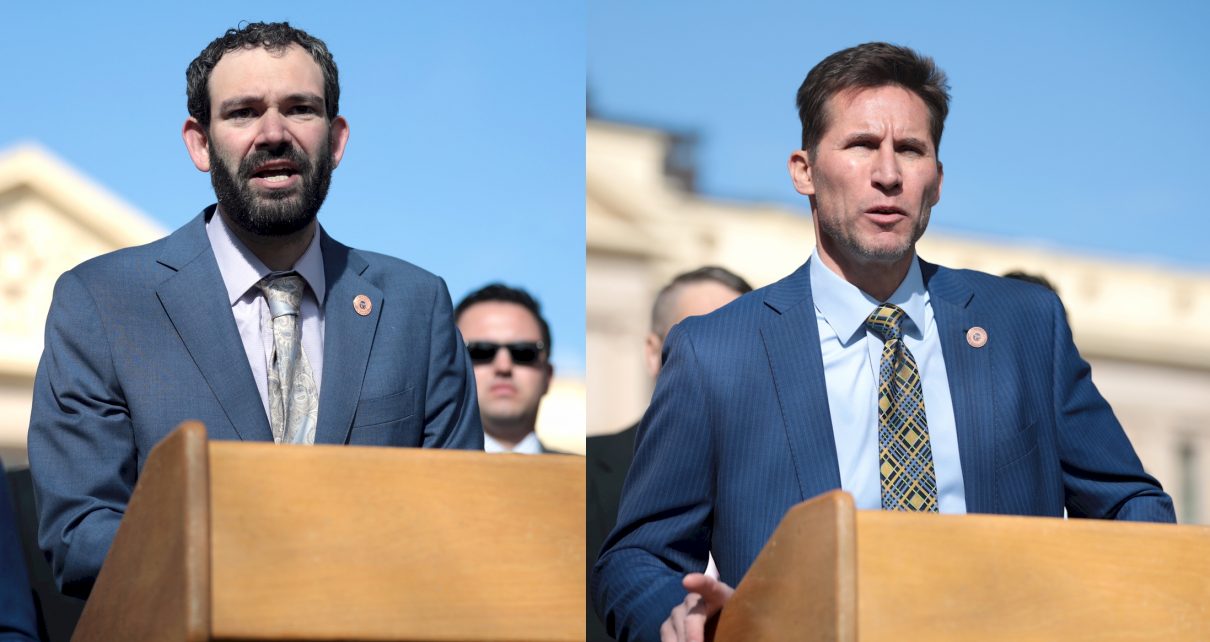
State Representatives Alexander Kolodin and Joseph Chaplik speaking with the media at a press conference for the Arizona Freedom Caucus at the Arizona Capitol building in Phoenix, Arizona, March 2, 2023
Kolodin and Chaplik Champion ‘AZ DOGE’ Bill Cutting Oversight Waste
House Bill 2031 aims to reduce unneccesary state boards and commissions
By Christy Kelly, February 26, 2025 8:34 am
In a decisive move to streamline government operations, the Arizona House of Representatives has advanced House Bill 2031, legislation aimed at reducing the number of state boards and commissions. The bill, introduced by District 3 Republican Representatives Alexander Kolodin and Joseph Chaplik, seeks to eliminate entities within the state’s regulatory framework deemed outdated or redundant.
The proposed legislation successfully passed through the House Regulatory Oversight Committee with a 3-2 vote and was deemed constitutional by the House Rules Committee with a unanimous 7-0 vote. On February 25, fellow Republican Rep. Selina Bliss (R-1) proposed an amendment limiting House Bill 2031, which was defeated, allowing the bill to advance with a “Do Pass” recommendation in the Committee of the Whole.
“This bill fulfills a great desire that the people of Arizona express at the ballot box to seriously take an axe to the size of government,” stated Kolodin during a committee hearing. He emphasized the public’s demand for a more efficient government structure, free from unnecessary bureaucratic layers.
A significant focus of HB 2031 is the reform of professional licensing requirements. The bill aims to remove barriers that hinder individuals from entering various professions, particularly those that currently mandate licenses for services deemed low-risk. “I want Arizonans of all demographics to have social mobility,” Representative Kolodin remarked. “So why would I make them go pay money, take time off work, go to school, and pay more money to get a professional license just so they can cut somebody’s nails?” By eliminating certain licensing requirements, the bill’s proponents believe it will foster economic growth and provide more opportunities for Arizonans.
Opponents of the bill, including industry representatives and nonprofit leaders, argue that many of the targeted boards serve crucial roles in maintaining safety standards and industry best practices. Kathy Colush, a former chairwoman of the American Association of Cosmetology Schools, warned that deregulating licensing for barbers and cosmetologists would devastate an industry primarily comprised of women and lower-income workers.
“This is a career, a trade that provides financial independence for thousands of Arizonans, many of whom are single mothers,” Colush stated.
On the House floor, Rep Teresa Martinez (R-16) argued that when she “turns grey” and starts to color her hair, “I want my cosmetologist to be licensed.”
Another central provision that has received debate is the proposed elimination of the Arizona Commission on the Arts. Established to support and advance the arts statewide, the commission provides grants and resources to artists, educational programs, and community initiatives. In the current fiscal year, thanks to a $2 million one-time legislative appropriation, the commission awarded over $2.6 million in grants to nonprofit arts organizations, programs, and creative workers throughout the state, enriching over 10 million individual arts experiences. Of that $2.6 million, nonprofit arts organizations received 80% as general operating support.
Christina You-sun Park, the commission’s Executive Director, expressed concern over the proposed bill: “Eliminating the Arts Commission would undermine essential support for Arizona’s cultural and artistic communities, which are vital to our state’s economy and quality of life.”
Kolodin, however, questioned the necessity of such government involvement in the arts, suggesting that private initiatives could effectively fulfill this role. “Government art is a terrible thing. That’s what we call propaganda,” he asserted, advocating for a shift towards privately funded arts initiatives.
The bill also targets the Arizona Companion Animal Spay and Neuter Committee, which provides sterilization services to homeless animals, animal shelters, and pet owners who cannot afford such procedures. This committee is funded by selling specialty pet license plates, with $17 from each plate contributing to its efforts.
Kolodin questioned the necessity of this committee, implying that such services were manageable without government intervention. “Companion Animal, Spay and Neuter Advisory Council? Sickos!” he remarked, highlighting his stance on reducing government involvement in areas he believes could be handled privately. Kolodin advised that if the group wanted to become a nonprofit, he could legislate the distribution of the license proceeds to them.
Additionally, the bill proposes dissolving the Student Transportation Advisory Council, which assists the Department of Public Safety in developing rules and recommending curricula for school bus driver safety and training. Established to enhance student transportation safety, the council has been inactive in recent years, with its last available meeting agenda dated December 14, 2021. Kolodin views the council’s inactivity as indicative of its redundancy, suggesting existing agencies could absorb its functions or manage it through alternative means.
The bill also proposes eliminating the Arizona Iceberg Lettuce Research Council, which conducts research for an industry producing over 29 million cartons of iceberg lettuce annually. The council reviews and awards research proposals on topics such as variety development and pest eradication. Kolodin questions the necessity of a state-funded council for this purpose, suggesting that the industry could support its own research initiatives without government involvement.
HB 2031’s progression has ignited discussions about the role of government in regulating professions and the necessity of certain boards and commissions. Supporters argue that the bill is a step toward reducing unnecessary government intervention, while opponents caution against the potential risks of deregulation.
Other regulatory bodies, including the Arizona Citrus Research Council, the Cotton Research and Protection Council, and the Arizona Beef Council, were omitted from the bill early. An amendment had removed those early on.
Kolodin emphasized during remarks about the bill, “This is a new Republican era and this is a new Republican majority.”
Just got my first bill back for our new DOGE committee and it's going to be lit! @JosephChaplik pic.twitter.com/MSuthbRQNx
— Rep. Alexander Kolodin (@realAlexKolodin) January 7, 2025
- Petersen Blasts Mayes for Wasteful Electors Case Appeal - November 21, 2025
- Kolodin Files Sweeping 2026 Election-Integrity Measure - November 20, 2025
- Roeberg Enters Growing Republican AG Candidate Field - November 20, 2025



